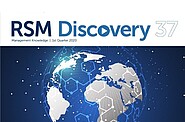Profile
Marcel van Rinsum is Professor of Accounting & Incentives
After obtaining a MSc in Business Economics with a specialization in Financial Management from the University of Amsterdam (with distinction), he earned his PhD degree in 2006. His teaching activities include bachelor, master, as well as MBA and executive courses. His research focuses on performance measurement and reporting, bonus systems and evaluation judgments, and has been published in international journals, including: Accounting and Business Research; Accounting, Organizations and Society; The Accounting Review; Behavioral Research in Accounting; Contemporary Accounting Research; European Accounting Review; Journal of Accounting Research; Long Range Planning; and Management Accounting Research.
Publications
Article (22)
Academic (13)
-
Pruijssers, J., & van Rinsum, M. (2024). The Effects of Client Importance and Career Concerns on Auditors’ Judgment Conservatism. Behavioral Research in Accounting, 36(1), 67-84. https://doi.org/10.2308/bria-2022-031
-
Hecht, G., Maas, V., & van Rinsum, M. (2023). The Effects of Transparency and Group Incentives on Managers’ Strategic Promotion Behavior. The Accounting Review, 98(7), 239-260. https://doi.org/10.2308/tar-2020-0208
-
Dalla Via, N., Perego, P., & van Rinsum, M. (2019). How Accountability Type Influences Information Search Processes and Decision Quality. Accounting, Organizations and Society, 75(May), 79-91. https://doi.org/10.1016/j.aos.2018.10.001
-
van Rinsum, M., Maas, V., & Stolker, D. (2018). Disclosure Checklists and Auditors' Judgments of Aggressive Accounting. The European Accounting Review, 27(2), 383-399. https://doi.org/10.1080/09638180.2017.1304228
-
Kramer, S., Maas, V., & van Rinsum, M. (2016). Relative Performance Information, Rank Ordering and Employee Performance: A Research Note. Management Accounting Research, 33(December), 16-24. https://doi.org/10.1016/j.mar.2016.03.004
-
van Rinsum, M. (2015). Discussion of "Managers' Discretionary Adjustments: The Influence of Uncontrollable Events and Compensation Interdependence". Contemporary Accounting Research, 32(1), 160-168. https://doi.org/10.1111/1911-3846.12100
-
de Jong, A., Hooghiemstra, RBH., & van Rinsum, M. (2014). To accept or reject an offer to join the board: Dutch evidence. Long Range Planning, 47(5), 262-276. https://doi.org/10.1016/j.lrp.2012.06.001
-
Maas, V., & van Rinsum, M. (2013). How Control System Design Influences Performance Misreporting. Journal of Accounting Research, 51(5), 1159-1186. https://doi.org/10.1111/1475-679X.12025
-
van Rinsum, M., & Verbeeten, FHM. (2012). The Impact of Subjectivity in Performance Evaluation Practices on Public Sector Managers' Motivation. Accounting and Business Research, 42(4), 377-396. https://doi.org/10.1080/00014788.2012.653747
-
Maas, V., van Rinsum, M., & Towry, KL. (2012). In Search of Informed Discretion: An Experimental Investigation of Fairness and Trust Reciprocity. The Accounting Review, 87(2), 617-644. https://doi.org/10.2308/accr-10205
-
van Rinsum, M., Douma, J., & Maas, V. (2012). Persoonlijkheid en de tevredenheid met accounting maatstaven onder onzekerheid. MAB, 86(4), 123-131. https://doi.org/10.5117/mab.86.16356
-
van Rinsum, M., den Dekker, RC., & Maas, V. (2011). Prestatiemeting ten Tijde van Economische Crisis: de Aanpak van DSM. MAB, 85(9), 430-436. https://doi.org/10.5117/mab.85.21898
-
van Rinsum, M., den Dekker, RC., & van Iersel, J. (2006). Sturen op Aandeelhouderswaarde - Implicaties voor Middenmanagementniveau. MAB, 80(4), 160-169. https://doi.org/10.5117/mab.80.16316
Popular (1)
-
Hartmann, F., van Rinsum, M., & Uytdehaage, IJ. (2000). Optieregeling voor alle werknemers is onwerkbaar. NRC Handelsblad, 7.
Professional (8)
-
van Rinsum, M. (2020). How to improve project funding decisions. RSM Discovery - Management Knowledge, 37, 25-27. http://hdl.handle.net/1765/124510
-
van Rinsum, M. (2017). How can auditors avoid the perils of aggressive accounting? RSM Discovery - Management Knowledge, 30(2), 14-16. http://hdl.handle.net/1765/100183
-
van Rinsum, M. (2014). Honesty presents a challenge in performance reporting. RSM Discovery - Management Knowledge, 19(3), 8-9. http://hdl.handle.net/1765/77137
-
van Rinsum, M. (2013). Informed discretion in performance evaluations. RSM Insight, 14(2), 8-10. http://hdl.handle.net/1765/41648
-
de Jong, A., Hooghiemstra, RBH., & van Rinsum, M. (2013). Attracting non-executive directors to the board. RSM Insight, 15(3), 11-12. http://hdl.handle.net/1765/41649
-
Bouwens, JMFG., Hartmann, F., Maas, V., Perego, P., & van Rinsum, M. (2003). Performance Management in Nederland. Management Control en Accounting, Oktober, 4-8.
-
Bouwens, JMFG., Hartmann, F., Maas, V., Perego, P., & van Rinsum, M. (2003). Performance Management en de Rol van de Controller in Nederland. Management Control en Accounting, April, 12-15.
-
Hartmann, F., van Rinsum, M., & Uytdehaage, IJ. (2000). Een optieregeling voor alle werknemers? Fiducie, 9(1), 7-8.
Chapter (1)
Professional (1)
-
Hartmann, F., & van Rinsum, M. (2001). Beloningsregelingen en Management Control. In E. de With, & L. Traas (Eds.), Handboek Management Accounting (pp. D4100-1-D4100-22). Uitgeverij Kluwer.
Conference proceeding (1)
Professional (1)
-
Naranjo-Gil, D., & van Rinsum, M. (2006). The effect of management style and management accounting system design on performance. In Journal of Applied Management Accounting Research (pp. 33-44)
Doctoral Thesis (1)
Internal (1)
-
van Rinsum, M. (2006). Performance Measurement and Managerial Time Orientation. [Doctoral Thesis, Erasmus University Rotterdam]. Erasmus University Rotterdam (EUR).
Editorial (1)
Academic (1)
-
van Rinsum, M., & van Veen-Dirks, P. (2022). Control in context – veerkracht in turbulente tijden. Maandblad voor Accountancy en Bedrijfseconomie, 96(9/10), 281. https://doi.org/10.5117/mab.96.94826
Inaugural speech (1)
Popular (1)
-
van Rinsum, M. (2019). Utilizing Incentives and Accountability: In Control in Control? Erasmus Research Institute of Management (ERIM). Inaugural Addresses Research in Management Series http://hdl.handle.net/1765/120287
Activities
Additional positions (2)
-
Maandblad voor Accountancy en BedrijfseconomieStart date approval: 10 Sep 2021End date approval: 09 Sep 2024Place: AMSTERDAMDescription: Editor (all editors are part of the board)
-
Stichting Financial and Management AccountingStart date approval: 10 Sep 2021End date approval: 09 Sep 2024Place: ROTTERDAMDescription: N/A
Additional activities (4)
-
MAB (Journal)Marcel van Rinsum (Editor)01 Oct 2019
Activity: Editorial work (Academic)
-
Management Accounting Research (Journal)Marcel van Rinsum (Member of editorial board)01 Jan 2019
Activity: Editorial work (Academic)
-
Accounting and Business Research (Journal)Marcel van Rinsum (Member of editorial board)01 Jun 2017
Activity: Editorial work (Academic)
-
The European Accounting Review (Journal)Marcel van Rinsum (Editor)01 Jun 2014
Activity: Editorial work (Academic)
Award
- Fellowship - ERIM early career talent programme (2006)
Courses
Financial and Tax Consulting
- Study year: 2023/2024
- Code: B3T6101
- Level: Bachelor 3, Bachelor 3, Bachelor 3
BSc Project Financial Strategist
- Study year: 2023/2024
- Code: B3T6103
- Level: Bachelor 3, Bachelor 3
IM Research clinic
- Study year: 2024/2025, 2023/2024, 2022/2023, 2021/2022, 2020/2021
- Code: BM-IM-RC
- Level: Master
Management Control
- Study year: 2024/2025, 2023/2024, 2022/2023, 2021/2022, 2020/2021, 2019/2020, 2018/2019
- Code: BM-IM12CC
- Level: Master
Past courses
Algorithms in Accounting and Control
- Study year: 2022/2023, 2021/2022, 2020/2021
- Code: BMME001
- Level: Master, Master, Master, Master
Management Control
- Study year: 2022/2023, 2021/2022, 2020/2021
- Code: BM06AFM
- Level: ERIM, Exchange, IM/CEMS, Master
Management Control
- Study year: 2022/2023
- Code: BMME179
- Level: ERIM, Exchange, IM/CEMS, Master, Master
Accounting
- Study year: 2020/2021
- Code: BM31MIM
- ECTS: 3 Level: Master
Accounting PT
- Study year: 2020/2021
- Code: BM31MIM-P
- ECTS: 3 Level: Master
Advanced Business Analysis and Valuation
- Study year: 2020/2021
- Code: BMME002
- ECTS: 6 Level: ERIM, Exchange, IM/CEMS, Master, Master
IM Research clinic
- Study year: 2020/2021, 2019/2020, 2018/2019
- Code: BM-IMRC
- Level: Master
Innovation Management
- Study year: 2020/2021
- Code: BM-IM09CC
- ECTS: 8 Level: Master
Accounting
- Study year: 2018/2019
- Code: BM05MIM
- ECTS: 2 Level: Master
Financial management & control
- Study year: 2017/2018, 2016/2017, 2015/2016
- Code: BM-IM07CC
- ECTS: 4 Level: Master
Management control
- Study year: 2015/2016
- Code: BM03AFM
- ECTS: 6 Level: Master
Financial Management
- Study year: 2014/2015
- Code: GW4006MD
- ECTS: 5 Level: Master
Financial Management
- Study year: 2014/2015
- Code: GW4006MV
- ECTS: 5 Level: Master
Financial management & control
- Study year: 2014/2015
- Code: IM07CC
- ECTS: 4 Level: Master
Management control
- Study year: 2014/2015
- Code: RSM03AC
- ECTS: 6 Level: Master
Featured on RSM Discovery
Helping managers understand the benefits of data analytics, big data, the Internet of Things, and artificial intelligence.






